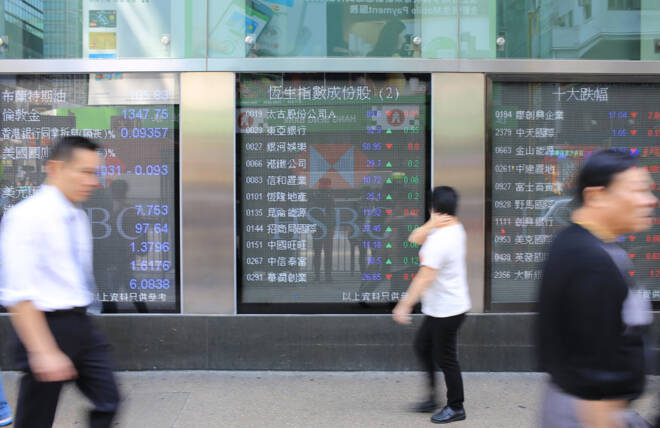Advertisement
Advertisement
Hang Seng Index Slides on Fed and US Tariff Jitters – Weekly Recap
By:
Key Points:
- Hang Seng Index dives 6.28% as China’s weak loan growth and US tariff fears rattle investor sentiment.
- China’s credit growth hits a record low; PBoC may need deeper rate cuts to revive loan demand.
- Iron ore prices fall 3.26% on weak China demand; gold drops 4.51% as Fed rate cut hopes fade.
US Equity Markets Slide Amid Shifting Fed Rate Cut Expectations
US equity markets reversed some of the previous week’s gains as investor focus turned to the Fed. The Nasdaq Composite Index slid by 3.15% in the week ending November 15, while the Dow and the S&P 500 declined by 1.24% and 2.08%, respectively.
Upbeat US Data Challenges Rate Cut Bets
Higher-than-expected US producer prices and retail sales, together with positive labor market data, tempered bets on a December Fed rate cut.
US producer prices increased by 2.4% year-on-year in October, up from 1.9% in September, signaling a potential upswing in consumer prices. Meanwhile, retail sales increased by 0.4% month-on-month in October, supported by tight labor market conditions.
Fed Chair Powell further dampened expectations for a December Fed rate hike, calling for caution on further policy moves until clearer economic trends emerge.
Mixed Signals from China Amid Tariff Worries
Credit data from China highlighted waning loan demand, potentially impacting consumption. Outstanding loan growth increased by 7.8% year-on-year in October, down from 8.1% in September. Loan growth weakened despite Beijing’s recent efforts to boost credit demand.
Despite loan growth slowing further, retail sales rose more than expected, increasing by 4.8% in October, while the unemployment rate dipped from 5.1% to 5.0%. While retail sales increased in October, consumer spending lagged Q1 2024 levels, dampening the effect of the data on market risk sentiment.
Amidst intensifying speculation about US tariffs on Chinese goods, industrial production fueled demand uncertainty. Industrial production rose by 5.3% year-on-year in October, down from 5.4% in September.
Sentiment toward US tariffs and China’s economic outlook continues to impact demand for HK and Mainland China-listed stocks.
Expert Views on China’s Economy and Stimulus
Natixis Asia Pacific Chief Economist Alicia Garcia Herrero remarked on China’s loan growth figures, stating,
“Scary credit data from #China is out for the month of October: Record low growth of total social financing (all types of financing included) at 7.8%. This means that the PBoC’ s turn towards laxer monetary conditions on September 24 is not reviving the demand for credit.”
Garcia Herrero suggested the PBoC needs to cut rates and the reserve requirement ratio (RRR) more aggressively than previously thought to boost credit demand.
However, Christopher Barraud, ranked first by Bloomberg as the top forecaster for China Economic Forecast Rankings in Q3 2024, remarked on Friday’s data, stating that home prices fell at the slowest pace since the stimulus boost. Barraud also noted that retail sales stabilized China’s economy.
Hang Seng Index and Mainland China Markets Dip on Tariff Threats
The Hang Seng Index slid by 6.28% to 19,426 in the week ending November 15. Falling bets on a December Fed rate cut contributed to the losses as investors assessed China’s latest economic data and Trump’s tariff threats. Real estate and tech stocks contributed to the weekly losses.
The Hang Seng Mainland Properties Index tumbled by 10.85%, while the Hang Seng Tech Index (HSTECH) declined by 7.29%.
Tech giants Alibaba (9988) and Baidu (9988) slid by 7.53% and 7.23%, respectively, while Tencent (0700) declined by 5.21%. Better-than-expected earnings limited Tencent’s losses.
On the Mainland, fears of US tariffs and economic uncertainty left the Indexes in negative territory. The CSI 300 dropped by 3.29%, while the Shanghai Composite declined by 3.52%.
Commodity Markets: Iron Ore and Gold
Commodity markets suffered heavy losses. Iron ore spot slid by 3.26% in the week on China demand concerns as US tariffs loom. Meanwhile, Gold prices fell 4.51% amid declining expectations for a December Fed rate cut.
ASX 200 Struggles Amid Pressure from Mining and Gold Stocks
The ASX 200 slipped by 0.12% in the week ending November 15 after gaining 2.17% in the previous week. Gold and mining stocks left the Index in negative territory.
Mining giants BHP Group Ltd. (BHP) and Rio Tinto Ltd. (RIO) slid by 7.67% and 7.75%, respectively, on falling iron ore spot prices. Gold stock Northern Star Resources Ltd. (NST) ended the week down 5.60%.
However, tech and banking stocks limited the losses. The S&P/ASX All Technology Index rallied 3.89%, with Commercial Bank of Australia leading banking stocks higher after reporting a stable loan book.
Nikkei Index Drops Amid Risk Aversion
In the week ending November 15, the Nikkei Index declined by 2.17%, partially reversing a 3.80% gain from the previous week. A stronger USD/JPY, which advanced by 1.12% to 154.281, failed to boost sentiment as investors considered the Fed rate path.
Tokyo Electron (8035) slid by 4.09%, while SoftBank Group Corp. (9984) ended the week down 4.78%.
Outlook
Key events, including PBoC and RBA rate decisions, US data, and stimulus chatter from Beijing, will likely influence market risk sentiment. Follow our latest updates to stay informed and manage your risks effectively.
About the Author
Bob Masonauthor
With over 28 years of experience in the financial industry, Bob has worked with various global rating agencies and multinational banks. Currently he is covering currencies, commodities, alternative asset classes and global equities, focusing mostly on European and Asian markets.
Advertisement
